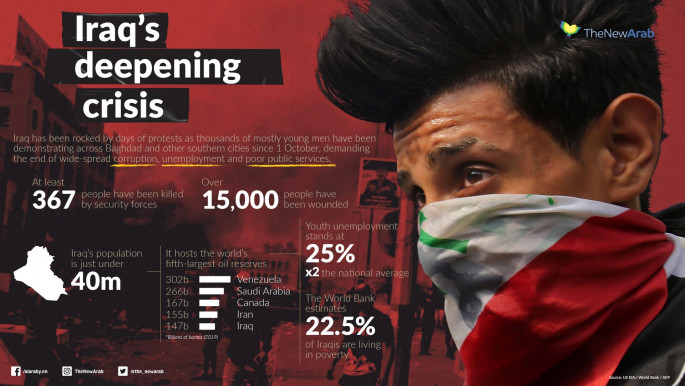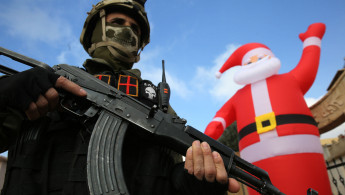No Christmas: Iraqi Christians cancel celebrations in solidarity with protests
The head of Iraq's Chaldean Catholic Church revealed his community would not hold public celebrations of Christmas out of respect for those killed and wounded in recent anti-government protests.
"There will be no decorated Christmas trees in the churches or streets, no celebrations and no reception at the patriarchate," announced the head of Iraq's Chaldean Catholic community, Patriarch Louis Raphael Sako.
The goodwill gesture comes amid mass rallies that have rocked Iraq's capital and southern cities, which been met with violence by security forces and armed groups, leaving nearly 430 dead and 20,000 wounded.
The protest have been concentrated in Shia Muslim-majority areas, but on Tuesday, a large part of Iraq's Christian community said it would take part in an act of solidarity.
Iraq's Christian minority has been ravaged by years of war, with just a third left out of the 1.5 million Christians living in the country before 2003.
Many are in Baghdad or the northern province of Nineveh.
Sako made the decision "out of respect for the dead and wounded among protesters and security forces, and in solidarity with the pains of their families".
As the demonstrations enter their third month, other non-Shia communities in Iraq have also expressed solidarity.
Sunni-majority Mosul has held funeral marches for those wounded further south and Salahaddin province announced three days of mourning for the fallen.
 |
Hundreds of students also marched in multi-ethnic Kirkuk.
On Sunday, Pope Francis slammed Iraq’s violent crackdown on protesters, as the death toll continued to mount despite the prime minister’s resignation.
“I am following the situation in Iraq with concern. It is with pain that I have learned of the protest demonstrations of the past days that were met with a harsh response, causing tens of victims,” Francis said at his weekly Sunday speech.
The Pope, who expressed his intentions to visit Iraq next year, said he was praying for those killed and wounded in the ongoing crackdown on protests in the country, before invoking God for peace in Iraq.
The act of solidarity comes as Iraqi politicians and their regional allies gathered in Baghdad to discuss how to resolve two months of protests that brought down the government amid continued violence across southern cities.
Among those attending the negotiations are two key allies of Iraq's main Shia parties: Iran's Revolutionary Guards commander Major General Qasem Soleimani and Lebanese power-broker Mohammad Kawtharany, a high-ranking political source told AFP.
"Soleimani is in Baghdad to push for a particular candidate to succeed Abdel Mahdi," the source said, without providing details.
Kawtharany, who is Lebanese militant group Hezbollah's pointman on Iraq, "is also playing a large role in persuading Shia and Sunni political forces on this", the source added.
Political powers in Shia-majority Iraq have long had close ties with counterparts in Iran and Lebanon.
Read more: The Iraq Report: The prime minister falls but the system remains
The United States said Soleimani's presence showed that its archfoe Iran was again "interfering" in Iraq.
Parties are considering a six-month "transitional" cabinet to oversee electoral reform before an early parliamentary vote, government and political sources told AFP.
A new electoral law is a key protest demand and is now a centrepiece of proposed reforms, with parliamentary blocs expected to discuss it on Tuesday.
A UN envoy warned that the continued use of violence against civilians in Iraq is "intolerable" and called on Iraqi leaders to respond with urgency to the Iraqi people's aspirations for real change.
"Political leaders do not have the luxury of time and must rise to the moment," Jeanine Hennis-Plasschaert, the UN envoy to Iraq, said in a video presentation to the UN Security Council on Tuesday.
Hennis-Plasschaert warned that attempts to buy time with "band-aid solutions and coercive measures ... will only further fuel public anger and distrust."
"The vast majority of protesters are evidently peaceful," Hennis-Plasschaert said. "Any and all forms of violence are intolerable, and must not distract from the rightful demands for reform."
However, she said that despite a review of the rules of engagement to minimise the use of lethal force, "the harsh reality is that the use of live fire has not been abandoned."
"Non lethal devices - such as tear gas canisters - continue to be used improperly causing horrific injuries or death, ... unlawful arrests and detentions continue to take place - as do abductions, threats and intimidation," she said.
Despite the oil wealth of OPEC's second-biggest producer, one in five Iraqis lives in poverty and youth unemployment stands at one quarter, the World Bank says.
Protesters say such problems require more deep-rooted solutions than the resignation of Abdel Mahdi, the first premier to step down since Iraq installed a parliamentary system after Saddam Hussein's overthrow in 2003.
Follow us on Twitter and Instagram to stay connected





 Follow the Middle East's top stories in English at The New Arab on Google News
Follow the Middle East's top stories in English at The New Arab on Google News


